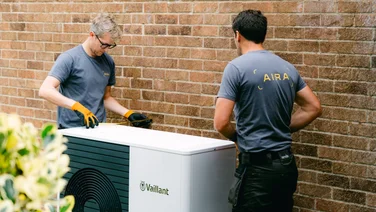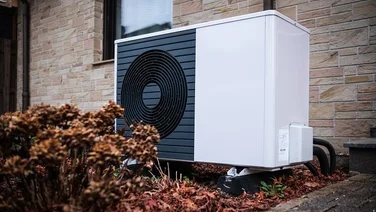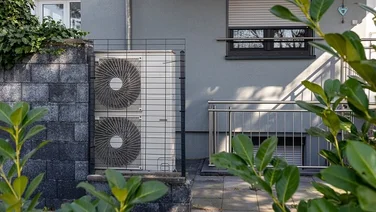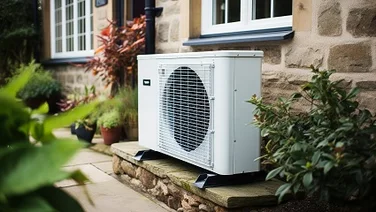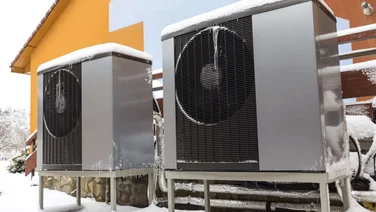We receive a small fee from trusted installers when you request a quote through our site. This helps us keep our content independent, well-researched and up to date – Learn more
- Update aims to make it easier and cheaper to own a heat pump
- Cavity wall and loft insulation are no longer prerequisites for the scheme
- Heat pumps to play ‘major role in the pathway to net zero emissions’, says Ofgem
- Changes take effect for applications from 8 May 2024

Ofgem’s property owner guidance for the Boiler Upgrade Scheme (BUS) has been updated today to make the installation of heat pumps easier and cheaper for homes and businesses.
The BUS offers upfront grants to reduce the installation cost of low-carbon heating technology, including £7,500 for air source heat pumps (ASHP) and ground source heat pumps (GSHP) and £5,000 for biomass boilers in domestic and non-domestic buildings in England and Wales.
The scheme’s new guidance means that homeowners will no longer be required to install cavity wall or loft insulation in order to qualify for the scheme, in a move that could save consumers up to £2,500 on the upfront costs of an installation.
The change in guidance is aimed at removing a significant barrier to heat pump adoption, and accelerate the UK’s transition away from natural gas boilers, in line with the Department for Energy Security and Net Zero (DESNZ) policy.
Homeowners will now be eligible for the scheme, even if there are outstanding insulation recommendations on their property’s Energy Performance Certificate (EPC).
The guidance states: “It is important that property owners understand that heat pumps perform best in a well-insulated property. From 8 May 2024, we accept EPCs with insulation recommendations. However, we expect that installers have a discussion with property owners about the benefits of energy efficiency measures and potential measures the property owner could take.”
The process for applying for the funding remains the same, with the installer making the application for the funding on the property owner’s behalf.
It is the installer’s obligation to ensure that they are certified by the Microgeneration Certification Scheme (MCS), provide all eligibility information, submit voucher applications and voucher redemption.
Installers are also responsible for passing the discount on to property owners. Property owners just need to confirm their consent to an application being made on their behalf. Landlords will need to inform their respective tenants of any installations.
The voucher has a three-month validity for ASHPs and biomass boilers, and a six-month validity period for GSHPs. The second stage is the voucher redemption application. Once complete, the installer receives the £7,500 payment for heat pumps and £5,000 for biomass boilers.
Bean Beanland, director for growth & external affairs, the Heat Pump Federation, told The Eco Experts: “Installers now have 120 to lodge applications, post the date of the MCS certificate. Previously, there was no limit. While we’d expect installers to usually apply for vouchers in advance of doing the work, the timeframe could be a problem if the industry is successful in future years and the voucher budget in any given year is exhausted beyond 120 years from the end of the budget year.
“If the growth from 2023-24 over 2022-23 is repeated, we will exhaust the budget in this current budget year. The question is when? Projects can be queued until 1 April for the next budget year, but only if there is less than 120 days to go from the date of the MCS certificate. Installers will need to be mindful of final commissioning dates.”
Also among the new guidelines is how the scheme’s payment plan works. Once an installer has had their application approved, the payment is scheduled on the next payment day, but takes an average of five working days to process.
There are restrictions to the scheme, which include previous grant funding.
The BUS is not available to properties that have already received public funding for a heat pump or biomass boiler in the past, through schemes like the Energy Company Obligation scheme.
Properties considered to be social housing under the Housing and Regeneration Act 2008 are also not eligible. New builds are also not eligible, unless they have been completed with a fossil fuel boiler.
To be eligible for the BUS grant, you must meet the following requirements:
- You must own the property you’re applying for, including if it’s a business, a second home, or a property you rent out to tenants
- You must be replacing fossil fuel heating systems, such as oil, gas, electric of LPG
- You must have a valid EPC certificate
You can get the BUS grant for a biomass boiler if you meet all these requirements:
- You property is off the gas grid
- Your property is in a rural location
- Your boiler has an emissions certificate showing that polluting emissions are kept to a minimum
According to Ofgem, which administers the scheme: “Heating homes, businesses and industry is responsible for a third of the UK’s greenhouse gas emissions”.
It goes on to state: “Heat pumps will play a major role in the pathway to net zero emissions as they are a well-established, proven technology which deliver effective heating and offer immediate and substantial carbon savings compared to fossil fuel heating”.
Watch the Positive Energy podcast episode 1: ‘What the hell is a heat pump? With Bean Beanland’ below
Want to know more about heat pumps?
Check out our guides below:


